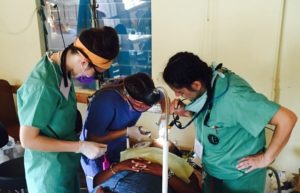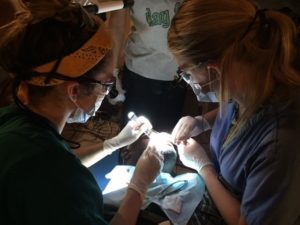Helping Members Lend a Hand
New Foundation for Endodontics/Specialized Dental Partners Domestic Access to Care Program supports member pro bono care
Do you provide pro bono treatments to patients in need? Would you like to, but don’t know where to start? The Foundation for Endodontics is now offering a new funding opportunity to support member-led access to care projects in their communities. Grant applications are open now and due by June 1.
Generously supported by Specialized Dental Partners for the next five years, funds from the Foundation can be used to cover the cost of endodontic equipment, supplies and other materials needed for local access to care projects. AAE endodontist members can apply up to three times for the single-year grants. Care can be provided in your office, at a clinic or as part of a special trip to an underserved area. Partner clinics can receive funds but the application must be submitted from the endodontist member as project lead.
“Since Day One of starting our company, elevating patient care and the specialty of endodontics have been our top priorities,” says Dr. Kirk A. Coury a founder of Specialized Dental Partners and past treasurer of the Foundation. “Giving our support to this initiative was a very easy choice to make. By partnering with the Foundation for Endodontics, we are providing the underserved in our communities the opportunity to save their teeth and experience just how life-changing that can be. Everyone wins: Our specialty, endodontists, but most importantly, our patients.”

The new program is a welcome funding opportunity for Dr. Juheon Seung of RCT Endo in Baltimore to expand the practice’s commitment to community service. After meeting the dental director of the Esperanza Center at Catholic Charities of Baltimore at a local dental meeting, the practice agreed to provide treatments at reduced fees to the Latinx community served by the center. Now hosting an annual Save A Tooth Day, RCT Endo’s entire staff of the nine-endodontist practice volunteers to provide free root canal treatments and restorations to upwards of 35 patients in one day over two shifts using four operatories for root canals and two for restorations, including space lent by the general dentist next door.
Considering the usual 20 percent cost of supplies for a typical treatment, Dr. Seung says funding through the Foundation/Specialized Dental Partners’ new program is welcome assistance and could open the door to expanding other projects like theirs “without straining the practice.”
For Dr. Brett Gilbert of King Endodontics in Niles, IL, going to Jamaica with the Foundation’s original international access to care program sparked a deep passion in caring for the underserved.
“It was amazing,” Dr Gilbert says. “If you experience something like this even once, your whole life changes—you get back so much more than you give…”
Contemplating how he would continue to help others after returning home, Gilbert said he decided to “stop thinking about it and just serve.” He volunteered to help the Chicago Dental Society community clinic in Wheaton, IL, set up an endodontic suite and ultimately “got everything donated…everything, down to every single file.”

Given the CDS clinic’s persistent waiting list of 25 patients in need of endodontic treatment, the Foundation grants would greatly help the clinic in its mission.
“We always have people waiting,” says CDS Foundation executive director Kristen Weber. The clinic serves 400 to 500 patients with up to 1,500 appointments each year.
As a member of Specialized Dental Partners, Gilbert is “so touched that this partnership is making such a deep, long-term dive” into its corporate commitment to the community.
For practices still in the exploratory stage of access to care program planning, Dr. Seung advises members to “identify the population you’d like to help very specifically. Then go find a church or school or clinic where the people are. There’s way more need out there than you would ever imagine, in rural areas and inner cities…even here right under our nose there is almost no access to specialist care. Anyone anywhere can do something like this.”




